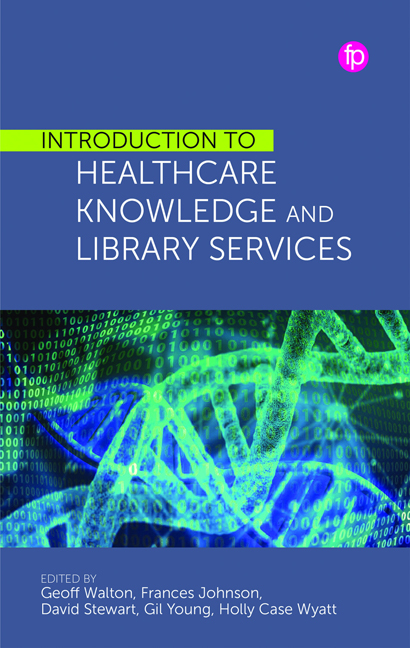Book contents
- Frontmatter
- Contents
- Figures, Tables and Case Studies
- Notes on Contributors
- Foreword
- How to Use this Book
- 1 An Introduction to Healthcare Knowledge and Library Services
- 2 Strategic Development for Healthcare Knowledge and Library Services
- 3 Exploring the Training and Development Needs of the Healthcare Knowledge and Library Services Workforce: A Case Study
- 4 Advocacy and How Knowledge and Library Specialists Tailor Services to Meet the Needs of Their Stakeholders
- 5 Mobilising Evidence and Knowledge
- 6 Internal and External Partnerships
- 7 Health Literacy, Patient Information and Combating Misinformation
- 8 Resource Discovery and Open Access
- 9 Growing the Evidence Base in Healthcare Knowledge and Library Services
- 10 Measuring Progress, Value and Impact in NHS Knowledge and Library Services
- 11 Reflective Practice in Healthcare Settings
- 12 Looking to the Future of Healthcare Knowledge Services
- Index
12 - Looking to the Future of Healthcare Knowledge Services
Published online by Cambridge University Press: 22 February 2024
- Frontmatter
- Contents
- Figures, Tables and Case Studies
- Notes on Contributors
- Foreword
- How to Use this Book
- 1 An Introduction to Healthcare Knowledge and Library Services
- 2 Strategic Development for Healthcare Knowledge and Library Services
- 3 Exploring the Training and Development Needs of the Healthcare Knowledge and Library Services Workforce: A Case Study
- 4 Advocacy and How Knowledge and Library Specialists Tailor Services to Meet the Needs of Their Stakeholders
- 5 Mobilising Evidence and Knowledge
- 6 Internal and External Partnerships
- 7 Health Literacy, Patient Information and Combating Misinformation
- 8 Resource Discovery and Open Access
- 9 Growing the Evidence Base in Healthcare Knowledge and Library Services
- 10 Measuring Progress, Value and Impact in NHS Knowledge and Library Services
- 11 Reflective Practice in Healthcare Settings
- 12 Looking to the Future of Healthcare Knowledge Services
- Index
Summary
Introduction
Prediction is very difficult, especially about the future.
Robert Storm Petersen (attrib.)As knowledge specialists we are extraordinarily well placed to see what is before us, what is right in front of our eyes. As we shape the knowledge services of tomorrow, our professional responsibility is to move beyond what we can already discern as we use our information skills to examine the evidence, data and trends and look to action.
Demand for healthcare is rising rapidly everywhere (PWC, 2023) as the world’s population is ageing. Every country in the world is experiencing growth in both the number and the proportion of older people. By 2030, 1 in 6 people will be aged 60 or over, an estimated 1.4 billion people worldwide. Between 2020 and 2050, the number of people aged 80 years or older is expected to triple to reach 426 million (World Health Organization (WHO), 2022).
Governments across the globe face growing pressure to reduce costs without limiting access to care and without impacting on quality. Hence, ‘Health systems are optimising human resources and adopting process-driven advances, standardised procedures and technological innovations to cut costs and improve quality’ (PWC, 2023).
Technological innovation is moving at pace, changing the nature of service delivery across sectors. People are familiar with applications from online shopping, social media and smart personal assistants to banking and travel. By 2015, Boeing 777 airline pilots were reporting that on a typical flight they spent a mere seven minutes manually flying the plane, primarily during takeoff and landing (Markoff, 2015). Data privacy is a concern for many. However, users may be less aware of the risks of bias within the algorithms that lie behind these technologies.
The essential characteristics of high technology are newness and complexity. High technology operates near the frontier of knowledge.
(New Zealand Institute of Economic Research (NZIER), 2016, 5)Healthcare is a knowledge intensive sector. Managing and applying knowledge – evidence from research and learning from experience – to better effect are part of the solution to the challenges identified. Investment in proactive knowledge services makes good business sense, impacting on quality, safety, productivity and cost.
The future of healthcare knowledge services is bright; it lies in the hands of our profession and it is important that we get it right.
The future of healthcare
Advances in the field of medicine are extraordinary, often nothing short of revolutionary.
- Type
- Chapter
- Information
- Introduction to Healthcare Knowledge and Library Services , pp. 203 - 234Publisher: FacetPrint publication year: 2024

